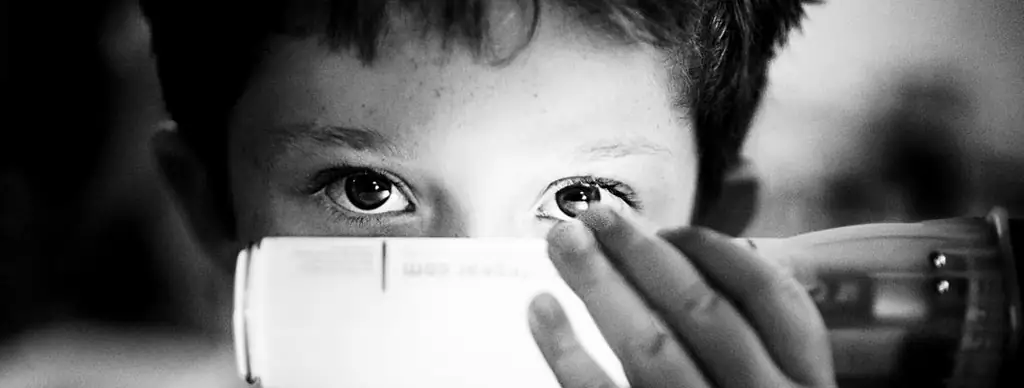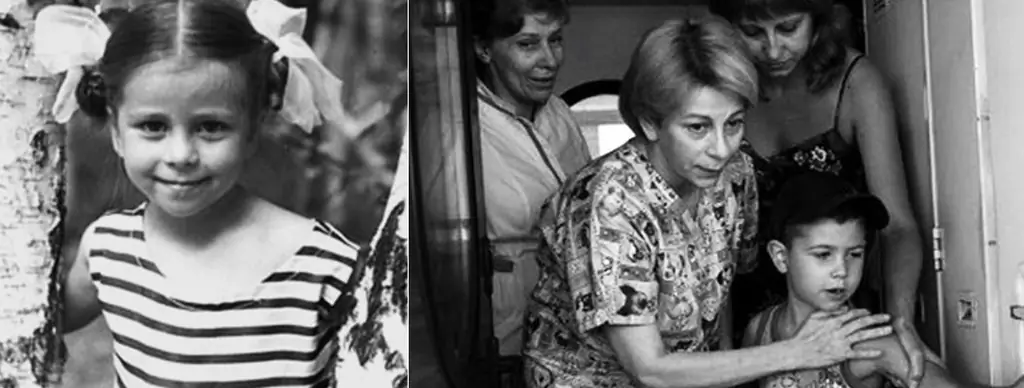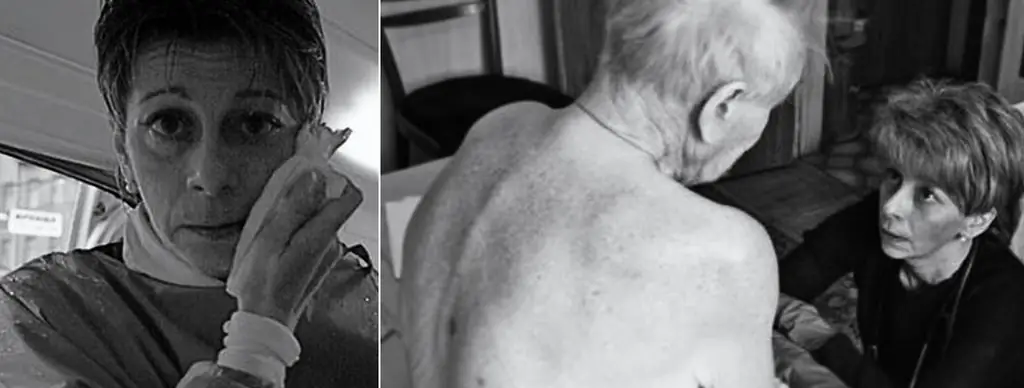- Author Adrian Jeff jeff@psychologosportal.com.
- Public 2023-12-17 05:06.
- Last modified 2025-01-24 14:09.

Dr. Lisa. Life is at the peak of love. Part 1. One, but fiery passion
Where did this fragile woman have so much energy, so much power of love to see the sea of human suffering every day and not lose heart, but on the contrary, to give people hope, joy and happiness? Even in the last line, even when you know with your mind for sure or almost for sure that there is no hope …
We are never sure that we will return alive, because war is hell on earth.
But we know that kindness, compassion and mercy are stronger than any weapon.
Dr. Lisa
She caused conflicting feelings because she was incomprehensible. Saint or possessed? How can a normal person do this? To devote her whole life to dying, outcast and "useless for society" people, while she had the opportunity to live happily in America with a wealthy husband and three beloved sons?
There was no one indifferent to her. For some, Dr. Lisa was the second mother Teresa, who brings to the world the values of mercy and humanism, awakening gratitude and love, on the one hand, and compassion and desire to help people, on the other. Others were irritated and even hated. Why breed idlers while feeding homeless people at the train station? Perhaps it is easier to apply euthanasia to the dying so that they do not suffer?
And she continued to do her "thankless" job, pulling another sick or homeless person out of the clutches of death every day. What drove her? Where did this fragile woman have so much energy, so much power of love, to see the sea of human suffering every day and not lose heart, but, on the contrary, to give people hope, joy and happiness? Even in the last line, even when you know with your mind for sure or almost for sure that there is no hope …

Dr. Lisa and the path she has chosen become clear to us thanks to the System-Vector Psychology of Yuri Burlan. The visual vector developed at the highest level predetermined her fate - the fate of a person who devoted himself to saving people's lives. The sound vector gave her a core, conviction in the chosen path, ideology, and the cutaneous and anal vectors set the energy with which these ideas were promoted.
The beginning of the way
Despite the numerous interviews to which Elizaveta Petrovna Glinka agreed (not with the aim of popularizing herself, but in an effort to germinate the seeds of ideas of humanism in society), one can hardly find information about her personal life in them. She always talked a lot about her work, about the sick and disadvantaged, whom she helps, wishing to build bridges of understanding between ordinary people and others, those who for some reason ended up outside of society. But she spoke very little about herself.
Not out of false modesty or secrecy. It's just that she was not interested in thinking and talking about herself for a long time. A person who has such a temperament (the power of desire), such a degree of development of mental properties and their realization, gradually loses the feeling of his separation from the external world, uniting with it, becoming one with it. The life of other people in such a person is so in priority over personal that only they think about, only for them there is time.
The sparse facts of the biography of Liza Glinka speak of the following. She was born on February 20, 1962 in Moscow. His father was a military man, his mother was a nutritionist. The environment from childhood was medical - my mother was on duty after three days, the children were looked after by neighbors, also doctors and nurses.
Liza had a brother Pavel, and at the age of 14 two more cousins appeared - the sons of her mother's brother, whose wife died. We lived in a two-room "Khrushchev", in the cramped quarters, but not in offense. True, the first time was difficult, because Lisa did not want them to live in her room.
Elizaveta Petrovna recalled her childhood as a very happy period of her life. She had many dolls, which she treated and wrote prescriptions for them. From the age of five she already knew that she would be a doctor. From about this age, she already learned to write and read, starting with her mother's prescription books and Mashkovsky's reference book. She also had a book "Providing emergency medical care", from which she wrote out complaints for the medical histories of her dolls.
At school, Lisa studied well, but reluctantly. She was not interested, because she had long known what she wanted to do in life. Medical reference books interested her much more than textbooks, and fractions were intimidating. But in the ballet and music schools I studied with pleasure. She played the piano, loved classical music. Apparently, music lessons became an important factor in the development of Lisa's sound vector, and ballet helped develop the skin vector - physical endurance, grace, flexibility, the ability to discipline and limit oneself in life, to subordinate oneself to goals.
Of course, the desire to help people was born in her largely under the influence of the environment in childhood. The visual vector develops thanks to the skill to bring emotions out, to transform the innate fear of the viewer - fear of death - into fear not for oneself, but for another, into sympathy and empathy.
Lisa had many opportunities for this. The girl constantly observed how people constantly came to her mother, a very active and very responsive person, for help - some to consult, some to simply measure blood pressure. Therefore, an endless stream of people always flowed through their cramped apartment. All this predetermined the choice of life path.

An important choice
Liza entered the 2nd Moscow State Medical Institute, which she graduated in 1986 with a diploma in the specialty of a pediatric resuscitator-anesthesiologist. The very choice of a profession spoke of interest in the problems of life and death as a manifested sound desire to touch the eternal secrets of life. Why was death always attracted to her so inevitably? Because a person with a sound vector, consciously or unconsciously, is looking for answers to questions about how life works, what death is and where we go after death. On the one hand, he knows that he will die, but for some reason he feels that this is not the end.
Elizaveta Petrovna spoke of the "complete cognitive dissonance" that she developed in connection with the theme of death. She understood that she hated death, was afraid of it, like everyone, especially a visual person, that she needed to fight for life until the last moment. And at the same time, she felt in a sonic way that death is a transition to eternal life, that is, in a sense, “the event is correct”. She was never able to reconcile these two understandings of death.
In 1990, she, along with her husband Gleb Glebovich Glinka, an American lawyer of Russian origin, left for the United States, where they had two sons. Later she adopted another child - the child of her patient from Saratov who died of oncology.
Elizaveta Petrovna's family life was happy. There was always complete understanding and mutual support with my husband. For her sake, he even moved to Russia when she decided to do it. She loved her sons deeply and tenderly. She said that her only mistake in life was that there were only three of them, while she wanted five. Liza devoted any free minute to her family, for her, as the owner of the anal vector, family values were very important.
A very strong and developed skin-visual ligament of vectors set its priorities - social realization, caring for many who needed her help. The call at any time of the day or night tore her away from her family and friends and made her rush to the call.
As the system-vector psychology of Yuri Burlan says, a woman with a cutaneous-visual ligament of vectors from ancient times had her specific role on an equal basis with men. She did not sit by the hearth and raise her children. In the state of "war" she went hunting and war with men, and in the state of "peace" she raised other people's children.
Elizaveta Petrovna reminds of those fearless skin-visual nurses and military doctors of the Great Patriotic War who, under the whistle of bullets and shelling, carried the wounded from the battlefield, sometimes at the cost of their own lives. Her path eventually led her to the place where it is most terrible - in the thick of the military events in the Donbass and in Syria, where she was able to realize her desire to save people to the maximum. And this crazy taste of real bestowal was dearer to her than the arranged life, from which she refused without regrets, having left America.
The sound vector was a serious support in a favorite business, it is he who seeks to transform the world, change society for the better and does not allow one to come to terms with the situation as it is.
Hospices - a test of death
In America, an event took place that further strengthened her desire to help precisely dying people. She ended up in a private hospice, which was not yet in Russia at that time, and she saw how grave, dying patients with dignity move here to another world. She saw patients who were clean, fed and not humiliated by "natural selection", who in such conditions have the opportunity to think about the eternal. As a patriot, she thought, why can't the people in Russia be given such an opportunity?
In 1991, she completed her second medical degree in palliative medicine at Dartmouth Medical School. This branch of medicine deals with symptomatic care for those patients who can no longer be cured, but who can be alleviated. Palliative medicine doctors are specialists who primarily work in hospices - homes where terminally ill people spend their last days.

For five years, Liza Glinka studied hospice work in America. Then I learned that the first such home for the dying had opened in Moscow, and I came here to participate in its work, and in 1999, she founded a hospice at an oncological hospital in Kiev. Elizaveta Petrovna also became a member of the board of the Vera Hospice Aid Fund, founder and president of the American VALE Hospice International Foundation.
What was the motivation for staying with dying patients all the time? Elizaveta Petrovna said that love. She loved her patients and understood that often no one needed them except her. Hospices were opened in Russia, but only for cancer patients, and there was still a whole layer of patients thrown out of life, with other serious diseases that no one dealt with. The Kiev hospice had only 25 beds. She went to other patients at home.
On the one hand, full of sympathy for lonely and confused people, on the other hand, always calm and smiling, she was the pivot on which a person could rely in a situation of complete loss of orientation. Pain is like panic. It rolls over, and you cease to adequately perceive reality. And there should always be someone nearby who will take the hand and calm.
Lisa was such a person. She deceived that everything would be fine - a lie to save her. She hugged her, spoke tender words, like a mother to a frightened child. And the most desperate, not believing in miracles, a person suddenly found peace and happiness from the feeling that someone loved and understood him. And he left enlightened and calm.
Only a person with a very developed visual vector, whose huge heart is capable of accommodating the suffering of the whole world, is capable of this. Its emotional amplitude ranges from fear of death, fear for oneself, to love for all of humanity. The one who managed to push his fear out, becomes invincible. He is no longer afraid of the "dirty" side of life. Initially squeamish and fainting from the sight of blood, the spectator ceases to pay attention to bad smells and the unsightly appearance of the patient. His pity and sympathy become active, aimed exclusively at the benefit of the patient.
Dr. Lisa was like that. She admitted that she was also afraid of death, rats, cockroaches, that she did not tolerate unpleasant odors. But she goes and does it, because no one else will do it.
Keeping calm, not going crazy with pity for these people, treating death as a normal phenomenon, she was helped by the sound vector, which does not give its owner the feeling of the finiteness of life. After all, the sound engineer feels that a person is not only a body, he is more than a body. And it was the sound vector that became the internal factor that made Elizaveta Petrovna an ideological human rights defender of the disadvantaged and dying and a public figure.
Part 2. In an attempt to change the world






